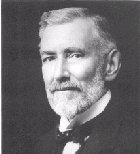Identity Statement for Sir Horace Plunkett
- Reference code: IE UCDA P27
- Title: Papers of Sir Horace Plunkett (1854–1932)
- Dates: 1923
- Level of description: Item
- Extent: 2pp
 Sir Horace Curzon Plunkett was born at Sherborne House, Gloucestershire in 1854, son of Lord Dunsany, of Dunsany Castle, Dunshaughlin, County Meath. He was educated at Eton and University College, Oxford. In the 1890s he pioneered agricultural co-operation, particularly among dairy farmers in the south of Ireland. In 1891, he was appointed a member of the Congested Districts Board and in 1892 was elected the Unionist MP for South County Dublin. In the following years, he continued developing agricultural policy in Ireland in his role as the first President of the Irish Agricultural Organisation Society (1894), and one of his major reports (Recess Committee 1896) led to the foundation of the Department of Agriculture and Technical Instruction for Ireland in 1899. In 1907, 84 Merrion Square was purchased for him and renamed "The Plunkett House" and became the headquarters of the agricultural co-operation movement. Politically, he became involved with the Home Rule movement, and wished to see Ireland united and within the Commonwealth. He founded the Irish Dominion League with this aim in mind. In 1922 he was made a Senator, and in 1923 his house was burned down during the Civil War, destroying many valuable works of art. He travelled widely advancing the cause of agricultural co-operation and gained many international accolades and awards. Also authored two books Ireland in the New Century (1904) and The Rural Life Problem of the United States (1910).
Sir Horace Curzon Plunkett was born at Sherborne House, Gloucestershire in 1854, son of Lord Dunsany, of Dunsany Castle, Dunshaughlin, County Meath. He was educated at Eton and University College, Oxford. In the 1890s he pioneered agricultural co-operation, particularly among dairy farmers in the south of Ireland. In 1891, he was appointed a member of the Congested Districts Board and in 1892 was elected the Unionist MP for South County Dublin. In the following years, he continued developing agricultural policy in Ireland in his role as the first President of the Irish Agricultural Organisation Society (1894), and one of his major reports (Recess Committee 1896) led to the foundation of the Department of Agriculture and Technical Instruction for Ireland in 1899. In 1907, 84 Merrion Square was purchased for him and renamed "The Plunkett House" and became the headquarters of the agricultural co-operation movement. Politically, he became involved with the Home Rule movement, and wished to see Ireland united and within the Commonwealth. He founded the Irish Dominion League with this aim in mind. In 1922 he was made a Senator, and in 1923 his house was burned down during the Civil War, destroying many valuable works of art. He travelled widely advancing the cause of agricultural co-operation and gained many international accolades and awards. Also authored two books Ireland in the New Century (1904) and The Rural Life Problem of the United States (1910).
Letter from Sir Horace Plunkett in Surrey to Mrs Alfred Hamilton, Foxrock, Dublin, concerning his revival of The Irish Statesman under the editorship of Æ (George Russell), in amalgamation with The Irish Homestead. Notes the editorial policy of the latter. Describes relations with its American backers, mentions its policy of supporting the Anglo-Irish Treaty and seeking Irish unity by conciliation. Refers to his health particularly in the aftermath of the destruction of his house during the Civil War, his views on Gnosticism and Agnosticism and to other matters.